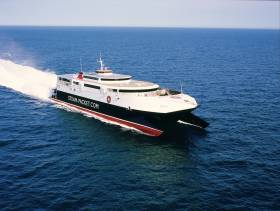Displaying items by tag: tourists
Manx Minister Wants More Tourists to Fill Sailings
#ferries - Manx minister for Enterprise wants to see fewer sailings operating at low capacity.
According to Manx Radio, the 2018 Isle of Man Passenger Survey results show the number of people travelling by sea dropped by 6% last year.
Tynwald (the island's Parliament) recently approved a plan for the future of the Isle of Man Steam Packet Company, after the government purchased the ferry operator last year.
Laurence Skelly is keen to attract more tourists to fill the empty seats.
To listen and watch the Minister speak on the radio station click the link here.
Famine Ship Needs €100K to Get Seaworthy
The Jeanie Johnston will need €100,000 to be made seaworthy again, it has emerged.
The three-masted barque - which not long ago sailed across the Atlantic - was missed at the weekend's Tall Ships festival, which attracted half a million visitors to Waterford.
But as the Sunday Independent reports, the ship is currently a stationary tourist attraction at berth in Dublin with her sails in storage.
Hopes are high, however, that the replica famine ship will be made ready as an ocean-going vessel in time for the Volvo Ocean Race in Galway next summer, not to mention the Tall Ships Races in Dublin next August.
"At the moment we are basically putting all the money coming in from the interactive tours, which have been very successful, back into the boat," said ship manager John O'Neill. "We are hopeful we will get the financial assistance we need to get the vessel back out to sea".

























































